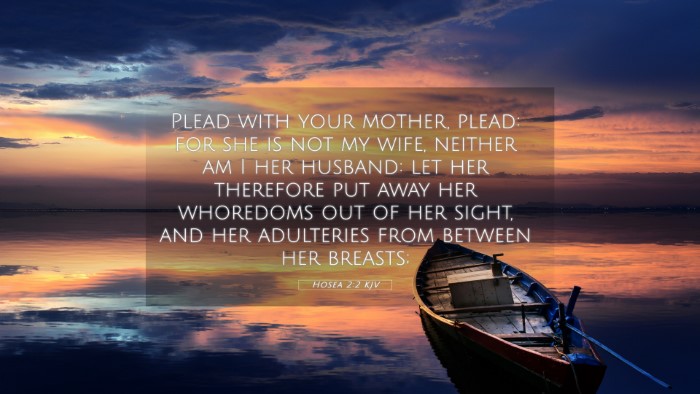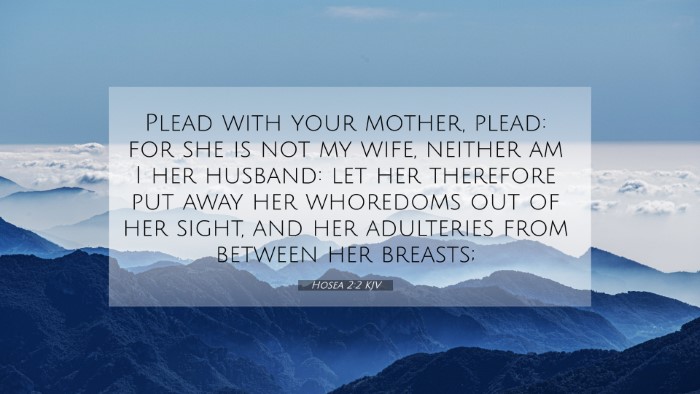Old Testament
Genesis Exodus Leviticus Numbers Deuteronomy Joshua Judges Ruth 1 Samuel 2 Samuel 1 Kings 2 Kings 1 Chronicles 2 Chronicles Ezra Nehemiah Esther Job Psalms Proverbs Ecclesiastes Song of Solomon Isaiah Jeremiah Lamentations Ezekiel Daniel Hosea Joel Amos Obadiah Jonah Micah Nahum Habakkuk Zephaniah Haggai Zechariah MalachiHosea 2:2 Similar Verses
Hosea 2:2 Cross References
Plead with your mother, plead: for she is not my wife, neither am I her husband: let her therefore put away her whoredoms out of her sight, and her adulteries from between her breasts;
Uncover the Rich Themes and Topics of This Bible Verse
Listed below are the Bible themes associated with Hosea 2:2. We invite you to explore each theme to gain deeper insights into the Scriptures.
Hosea 2:2 Cross Reference Verses
This section features a detailed cross-reference designed to enrich your understanding of the Scriptures. Below, you will find carefully selected verses that echo the themes and teachings related to Hosea 2:2 KJV. Click on any image to explore detailed analyses of related Bible verses and uncover deeper theological insights.
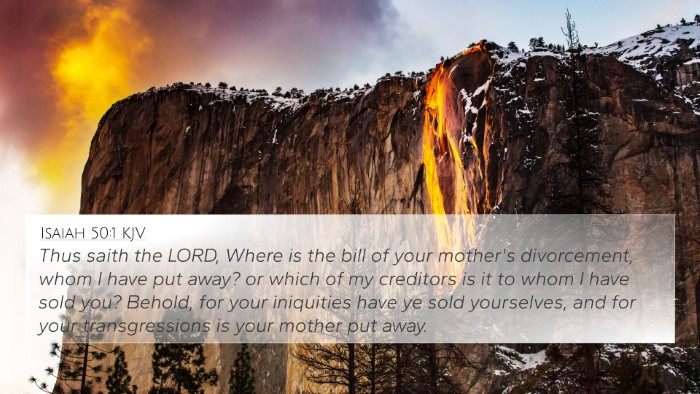
Isaiah 50:1 (KJV) »
Thus saith the LORD, Where is the bill of your mother's divorcement, whom I have put away? or which of my creditors is it to whom I have sold you? Behold, for your iniquities have ye sold yourselves, and for your transgressions is your mother put away.
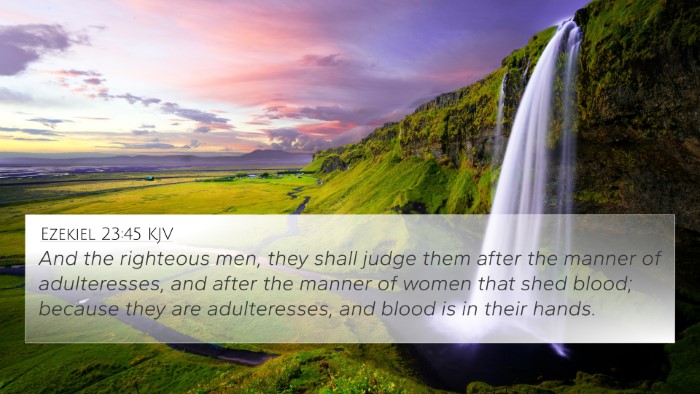
Ezekiel 23:45 (KJV) »
And the righteous men, they shall judge them after the manner of adulteresses, and after the manner of women that shed blood; because they are adulteresses, and blood is in their hands.
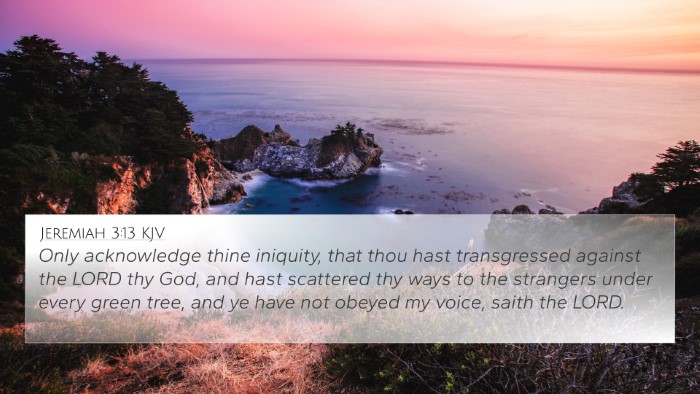
Jeremiah 3:13 (KJV) »
Only acknowledge thine iniquity, that thou hast transgressed against the LORD thy God, and hast scattered thy ways to the strangers under every green tree, and ye have not obeyed my voice, saith the LORD.

Jeremiah 3:1 (KJV) »
They say, If a man put away his wife, and she go from him, and become another man's, shall he return unto her again? shall not that land be greatly polluted? but thou hast played the harlot with many lovers; yet return again to me, saith the LORD.
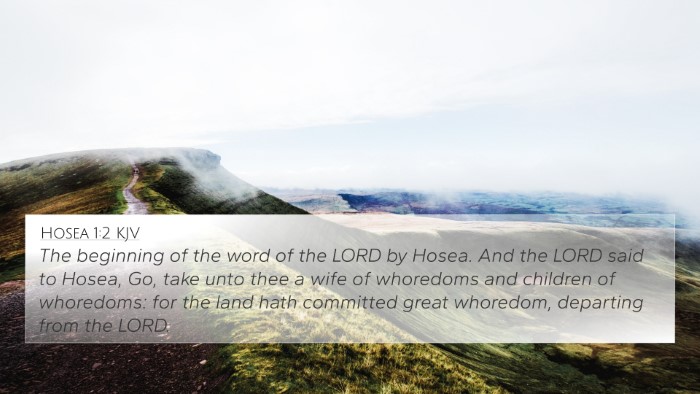
Hosea 1:2 (KJV) »
The beginning of the word of the LORD by Hosea. And the LORD said to Hosea, Go, take unto thee a wife of whoredoms and children of whoredoms: for the land hath committed great whoredom, departing from the LORD.
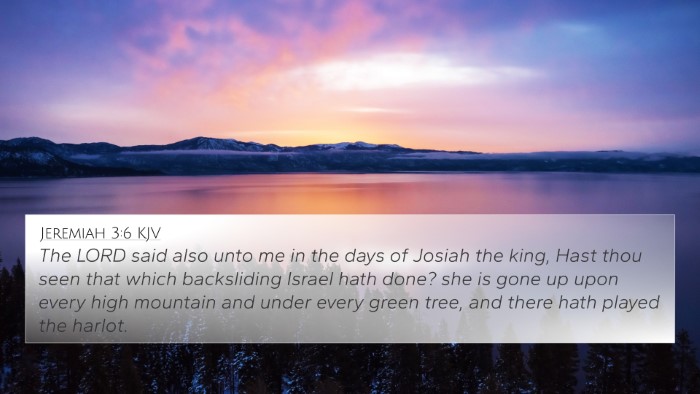
Jeremiah 3:6 (KJV) »
The LORD said also unto me in the days of Josiah the king, Hast thou seen that which backsliding Israel hath done? she is gone up upon every high mountain and under every green tree, and there hath played the harlot.
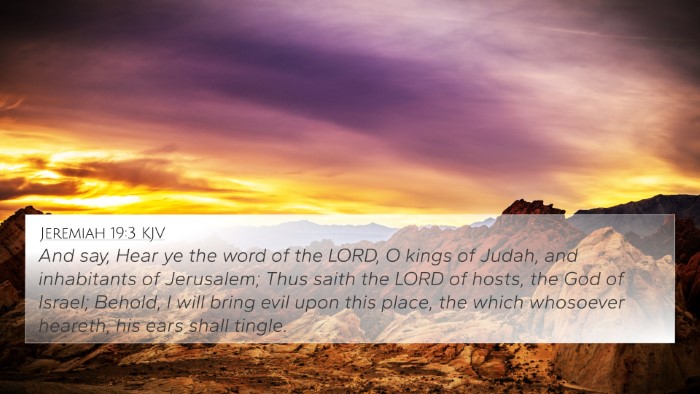
Jeremiah 19:3 (KJV) »
And say, Hear ye the word of the LORD, O kings of Judah, and inhabitants of Jerusalem; Thus saith the LORD of hosts, the God of Israel; Behold, I will bring evil upon this place, the which whosoever heareth, his ears shall tingle.
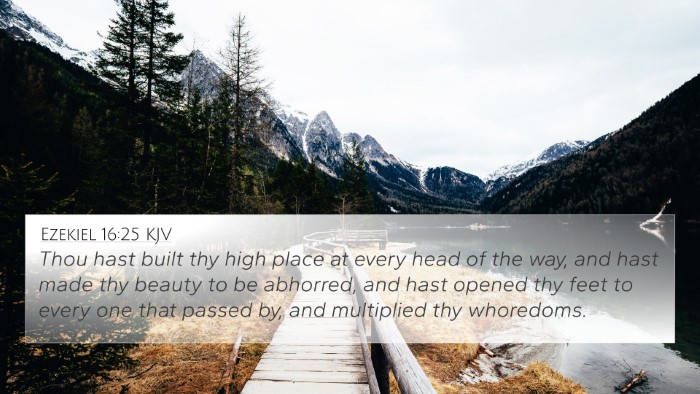
Ezekiel 16:25 (KJV) »
Thou hast built thy high place at every head of the way, and hast made thy beauty to be abhorred, and hast opened thy feet to every one that passed by, and multiplied thy whoredoms.
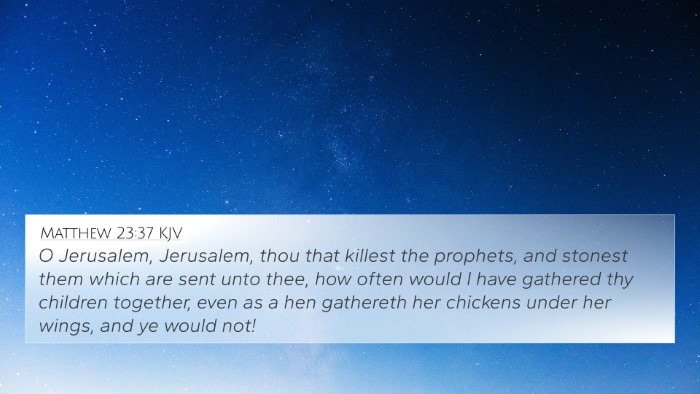
Matthew 23:37 (KJV) »
O Jerusalem, Jerusalem, thou that killest the prophets, and stonest them which are sent unto thee, how often would I have gathered thy children together, even as a hen gathereth her chickens under her wings, and ye would not!
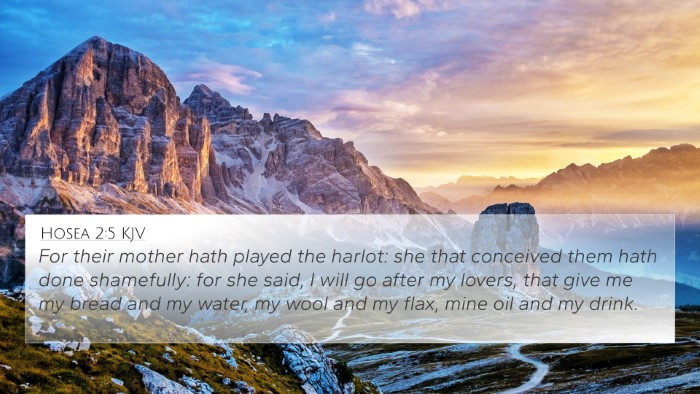
Hosea 2:5 (KJV) »
For their mother hath played the harlot: she that conceived them hath done shamefully: for she said, I will go after my lovers, that give me my bread and my water, my wool and my flax, mine oil and my drink.
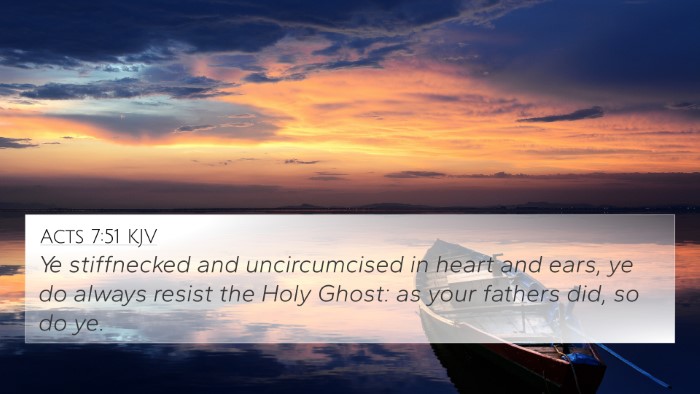
Acts 7:51 (KJV) »
Ye stiffnecked and uncircumcised in heart and ears, ye do always resist the Holy Ghost: as your fathers did, so do ye.

Ezekiel 20:4 (KJV) »
Wilt thou judge them, son of man, wilt thou judge them? cause them to know the abominations of their fathers:
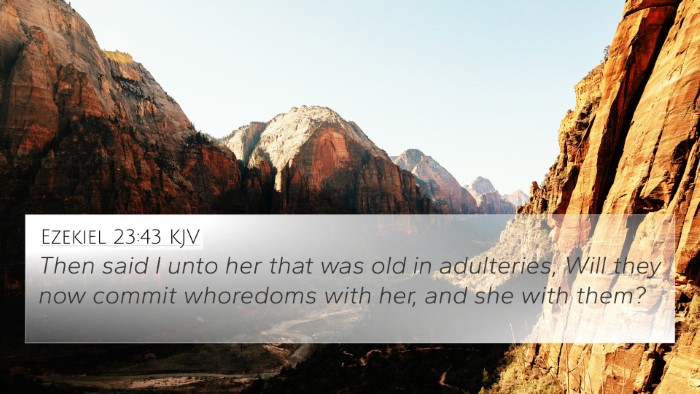
Ezekiel 23:43 (KJV) »
Then said I unto her that was old in adulteries, Will they now commit whoredoms with her, and she with them?
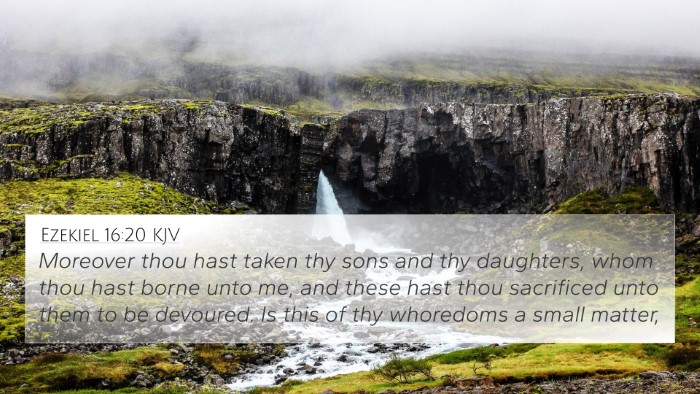
Ezekiel 16:20 (KJV) »
Moreover thou hast taken thy sons and thy daughters, whom thou hast borne unto me, and these hast thou sacrificed unto them to be devoured. Is this of thy whoredoms a small matter,
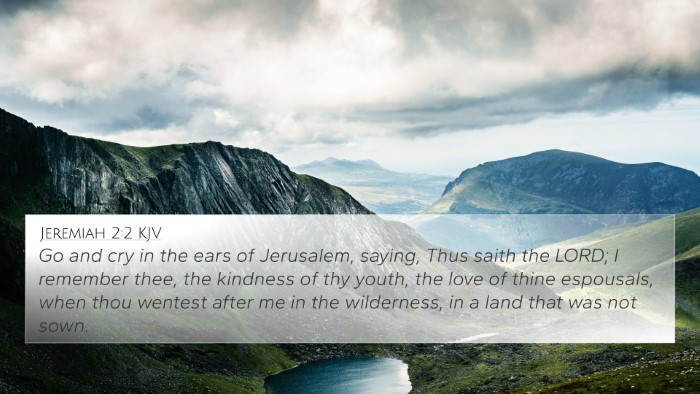
Jeremiah 2:2 (KJV) »
Go and cry in the ears of Jerusalem, saying, Thus saith the LORD; I remember thee, the kindness of thy youth, the love of thine espousals, when thou wentest after me in the wilderness, in a land that was not sown.
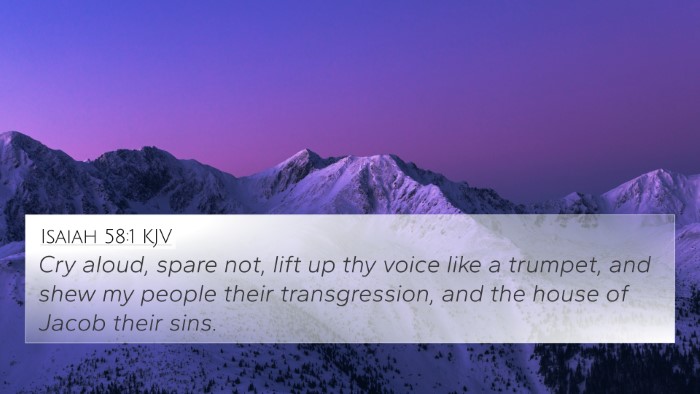
Isaiah 58:1 (KJV) »
Cry aloud, spare not, lift up thy voice like a trumpet, and shew my people their transgression, and the house of Jacob their sins.
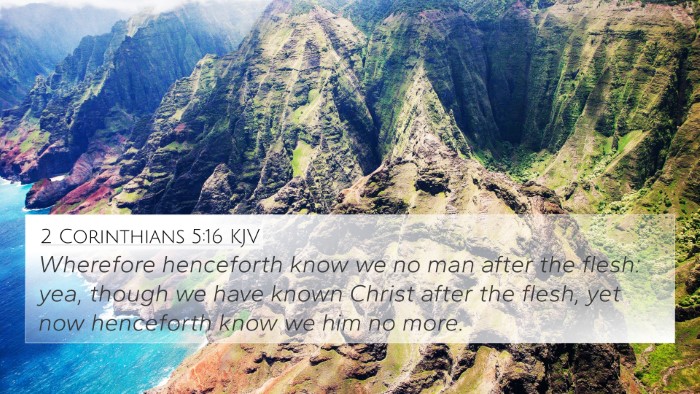
2 Corinthians 5:16 (KJV) »
Wherefore henceforth know we no man after the flesh: yea, though we have known Christ after the flesh, yet now henceforth know we him no more.
Hosea 2:2 Verse Analysis and Similar Verses
Understanding Hosea 2:2
Verse: "Plead with your mother, plead: for she is not my wife, neither am I her husband: let her therefore put away her whoredoms out of her sight, and her adulteries from between her breasts."
Summary of Hosea 2:2
This verse is a poignant call from God through the prophet Hosea, directing the children of Israel to address their mother, symbolizing the nation or the people who have turned away from God. The language used is that of a marital relationship, highlighting the unfaithfulness of Israel akin to adultery. God, as the husband, expresses His longing for reconciliation and the need for repentance. The focus here is on the mother's spiritual unfaithfulness, urging her to abandon her illicit ways.
Commentary Insights
This passage encompasses rich theological insights from several public domain commentaries:
- Matthew Henry: Henry emphasizes the metaphor of marriage, indicating that Israel's idolatry is equivalent to cheating on God. He notes that pleading with the mother represents a call to repentance and the restoration of the covenant relationship between God and His people. This divine plea reflects God's enduring love and desire for fidelity from His followers.
- Albert Barnes: Barnes highlights the significance of the maternal metaphor, noting that it conveys a sense of belonging and responsibility. He explains that 'plead' conveys urgency and seriousness, suggesting a need for action to cleanse the nation of its sins. Barnes also connects this verse with the broader narrative of Hosea, which revolves around the themes of judgment, mercy, and hope for restoration.
- Adam Clarke: Clarke focuses on the implications of the metaphorical family language used by God. He suggests that the plea is not merely a call for ethical living but a prophetic declaration that emphasizes the urgency of returning to the true worship of God. Clarke also points to the moral decay represented by 'whoredoms' and 'adulteries,' underscoring God's disappointment and heartbreak over Israel's choices.
Bible Verse Cross-References
Hosea 2:2 relates to several other biblical texts that explore similar themes of unfaithfulness, judgment, and call for repentance. Here are some relevant cross-references:
- Jeremiah 3:1: "They say, If a man put away his wife, and she go from him, and become another man's, shall he return unto her again? shall not that land be greatly polluted? but thou hast played the harlot with many lovers; yet return again to me, saith the LORD." - This verse parallels Hosea in the theme of unfaithfulness and God's call for repentance.
- Ezekiel 16:32: "But as a wife that committeth adultery, which taketh strangers instead of her husband!" - This highlights the severity of Israel's betrayal of God.
- Isaiah 54:5: "For thy Maker is thine husband; the LORD of hosts is his name; and thy Redeemer, the Holy One of Israel; The God of the whole earth shall he be called." - This verse affirms God’s role as the husband of Israel.
- Hosea 1:2: "The beginning of the word of the LORD by Hosea: and the LORD said to Hosea, Go, take unto thee a wife of whoredoms and children of whoredoms: for the land hath committed great whoredom, departing from the LORD." - This sets the precedent for understanding the metaphor of unfaithfulness in Hosea.
- Revelation 2:4-5: "Nevertheless I have somewhat against thee, because thou hast left thy first love. Remember therefore from whence thou art fallen, and repent, and do the first works; or else I will come unto thee quickly, and will remove thy candlestick out of his place, except thou repent." - Echoing the importance of remaining faithful to God.
- Romans 6:1-2: "What shall we say then? Shall we continue in sin, that grace may abound? God forbid. How shall we, that are dead to sin, live any longer therein?" - Discussing the idea of forsaking sin and returning to righteousness.
- James 4:4: "Ye adulterers and adulteresses, know ye not that the friendship of the world is enmity with God? whosoever therefore will be a friend of the world is the enemy of God." - A New Testament reflection on spiritual fidelity.
Connections Between Bible Verses
The interconnectedness of biblical scripture can deepen understanding of Hosea 2:2 through the process of cross-referencing. Observing these connections reveals a thematic dialogue throughout the Bible regarding fidelity, judgment, and redemption.
Comparative Bible Verse Analysis
Engaging in comparative analysis among the verses cited above illustrates a continuum of message across both the Old and New Testaments. Linkages can be observed in the repeated warnings against spiritual infidelity and the divine call towards reconciliation.
Tools for Bible Cross-Referencing
For those interested in exploring these themes further, various tools can enhance your study and understanding:
- Use a Bible concordance to find key themes and related verses.
- Maintain a Bible cross-reference guide for in-depth studies.
- Utilize a cross-reference Bible study to connect scripture passages effectively.
- Explore comprehensive Bible cross-reference materials that provide thematic analyses.
How to Use Bible Cross-References
Learning how to identify connections between Old and New Testament scriptures can be a rewarding endeavor. It strengthens one’s understanding of the Bible’s unified message and encourages deeper study:
- Identify themes and trace their development throughout Scripture.
- Engage in a comparative study of Pauline epistles to observe doctrinal continuities.
- Recognize links between the Prophets and Apostolic teachings to appreciate the continuity of God’s message.
Conclusion
Hosea 2:2 serves as a vital reminder of the importance of faithfulness in our relationship with God. It encapsulates themes of love, betrayal, and the hope of restoration. The insights derived from public domain commentaries and the connections highlighted through related verses form a robust framework for understanding the depth of meaning in this poignant plea.

